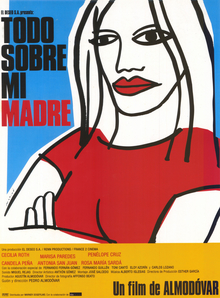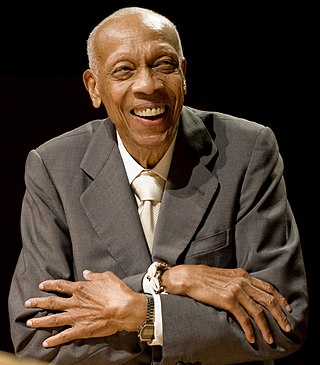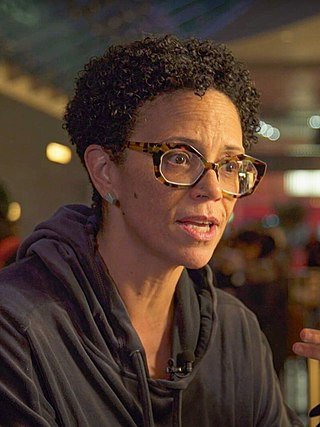Related Research Articles

All About My Mother is a 1999 comedy-drama film written and directed by Pedro Almodóvar, and starring Cecilia Roth, Marisa Paredes, Candela Peña, Antonia San Juan, Penélope Cruz, Rosa Maria Sardà, and Fernando Fernán Gómez.

Vaginal Davis is an American performing artist, painter, independent curator, composer, filmmaker and writer. Born intersex and raised in South Central, Los Angeles, Davis gained notoriety in New York during the 1980s, where she inspired the Bushwick neighborhood of Brooklyn's prevalent drag scene as a genderqueer artist. She currently resides in Berlin, Germany.

José Esteban Muñoz was a Cuban American academic in the fields of performance studies, visual culture, queer theory, cultural studies, and critical theory.

Dionisio Ramón Emilio Valdés Amaro, better known as Bebo Valdés, was a Cuban pianist, bandleader, composer and arranger. He was a central figure in the golden age of Cuban music, especially due to his big band arrangements and compositions of mambo, chachachá and batanga, a genre he created in 1952.

Elżbieta Justyna Czyżewska was a Polish actress active in both Poland and the United States. She began her career in Poland before moving to New York City in the 1960s.
Marga Gomez is a comedian, writer, performer, and teaching artist from Harlem, New York. She has written and performed in thirteen solo plays which have been presented nationally and internationally. Her acting credits include Off-Broadway and national productions of The Vagina Monologues with Rita Moreno. She also acted in season two of the Netflix series Sense8. At the start of the coronavirus pandemic, Gomez pivoted to adapting and presenting her work for live streaming. She has been featured in online theater festivals from New York to San Diego, as well as a five-week virtual run for Brava, SF where she is an artist-in-residence. She is a GLAAD media award winner and recipient of the 2020 CCI Investing in Artists grant.

Jade Esteban Estrada is an American singer, actor, stand-up comedian, journalist and human rights activist. Out Magazine called him "the first gay Latin star."
Holly Hughes is an American lesbian performance artist.

María Irene Fornés was a Cuban-American playwright, theater director, and teacher who worked in off-Broadway and experimental theater venues in the last four decades of the twentieth century. Her plays range widely in subject matter, but often depict characters with aspirations that belie their disadvantages. Fornés, who went by the name "Irene", received nine Obie Theatre Awards in various categories and was a finalist for the Pulitzer Prize in Drama for 1990.
Ibis del Carmen Gómez-Vega is a Cuban-American Latina novelist, short story writer, playwright, and literary critic. She is an associate professor of twentieth-century American literature, ethnic literature, American drama, and gay and lesbian literature in the department of English at Northern Illinois University.
Ana María Simo is a New York playwright, essayist and novelist. Born in Cuba, educated in France, and writing in English, she has collaborated with such experimental artists as composer Zeena Parkins, choreographer Stephanie Skura and filmmakers Ela Troyano and Abigail Child.

Coco Fusco is a Cuban-American interdisciplinary artist, writer, and curator whose work has been widely exhibited and published internationally. Fusco's work explores gender, identity, race, and power through performance, video, interactive installations, and critical writing.
National Queer Arts Festival (NQAF) is an annual queer festival in San Francisco organized by the Queer Cultural Center and established in 1998 to coincide with Pride Month.

New York Film Festival Downtown was a New York-based film festival founded by Tessa Hughes-Freeland and Ela Troyano in 1984. With independent and "positively avante-garde" programming, it came to prominence in the East Village art scene and ran for five years, ending in 1988.
Split Britches is an American performance troupe, which has been producing work internationally since 1980. Academic Sue Ellen Case says "their work has defined the issues and terms of academic writing on lesbian theater, butch-femme role playing, feminist mimesis, and the spectacle of desire". In New York City Split Britches have long standing relationships with La Mama Experimental Theatre Company, where they are a resident company, Wow Café, which Weaver and Shaw co-founded, and Dixon Place.
Tessa Hughes-Freeland is a British-born experimental film maker, writer living in New York City. Her films have screened internationally in North America, Europe and Australia and in prominent museums and galleries, including the Museum of Modern Art (MOMA); the Museum of Contemporary Art, Los Angeles; the Whitney Museum of American Art; the New Museum of Contemporary Art in New York; and the KW Institute of Contemporary Art in Berlin. She has collaborated on live multi-media projects with musicians like John Zorn and J. G. Thirlwell. She and Ela Troyano co-founded the New York Film Festival Downtown in 1984 and served as its co-directors until 1990. Hughes-Freeland later served as President of the Board of Directors of the Film-Makers Co-Operative in New York City from 1998-2001. She has published articles in numerous books, including “Naked Lens: Beat Cinema” and “No Focus: Punk Film,” and in periodicals including PAPER Magazine, Filmmaker magazine, GQ, the East Village Eye, and Film Threat.
WOW Café Theater is a feminist theater space and collective in East Village in New York City. In the mid-1980s, WOW Cafe Theater was central to the avant garde theatre and performance art scene in the East Village, New York City. Among the artists who have presented at the space are Peggy Shaw, Lois Weaver, Patricia Ione LLoyd, Lisa Kron, Holly Hughes, Deb Margolin, Dancenoise, Carmelita Tropicana, Eileen Myles, Split Britches, Seren Divine, Johnny Science, and The Five Lesbian Brothers.
Monica Palacios is a Chicana lesbian American playwright and performer, specialising in Chicana, queer, feminist, and lesbian themes. She has charted the intersection of queer and Latina identities in Latinx communities, with their mutually marginalising impact. A trailblazer stand-up comedian in the 1980s and 1990s, Palacios is now better known for her work as an award winning playwright and activist. Her works are taught in many schools and colleges, where she has served frequently as a director of student theatre.
Aliza Shvarts is an artist and writer who works in performance, video, and installation. Her art and writing explore queer and feminist understandings of reproduction and duration, and use these themes to affirm abjection, failure, and "decreation". Simone Weil's idea of decreation has been described as "a mystical passage from the created to the uncreated" and "a spiritual exercise of mystical passage: across a threshold, from created to uncreated".

Desi's Looking for a New Girl is a 2000 American comedy-drama film written and directed by Mary Guzmán.
References
- 1 2 "Brooklyn Museum feature on Carmelita Tropicana".
- ↑ "1999 Obie Award Winners". Obie Awards.
- ↑ "Carmelita Tropicana: Leche de Amnesia". hemisphericinstitute.org. 2001. Archived from the original on March 27, 2018. Retrieved March 27, 2018.
- ↑ "Carmelita Tropicana: Your Kunst Is Your Waffen (1996)". Movies & TV Dept. The New York Times . Archived from the original on 30 January 2013. Retrieved 5 September 2012.
- ↑ Shohat, Ella (1998). Talking Visions. Massachusetts Institute of Technology.
- ↑ Holden, Stephen (19 July 1996). "FILM REVIEW; A Lesbian Perspective". The New York Times . Retrieved 5 September 2012.
- ↑ WOW Café Theater Story, WOWCafe.org. Retrieved 23 September 2012.
- ↑ "Vaginal Davis". Studio Museum in Harlem . 6 July 2010. Archived from the original on 8 June 2012. Retrieved 12 March 2013.
- ↑ Grode, Eric (24 May 2012). "Post Plastica". The New York Times . Retrieved 5 September 2012.
- ↑ Klein, Alvin (16 April 2000). "JERSEY FOOTLIGHTS; Summer Stock With Edge". The New York Times . Retrieved 5 September 2012.
- ↑ La Rocco, Claudia (29 June 2011). "An Auld Lang Syne Kicks Off an Artistic Diaspora". The New York Times . Retrieved 5 September 2012.
- ↑ Troyano, Alina. I, Carmelita Tropicana: Performing between Cultures. Boston: Beacon, 2000. ISBN 0807066036
- ↑ PhD, María Dolores Costa (2003-06-01). "Latina Lesbian Writers and Performers". Journal of Lesbian Studies. 7 (3): 5–27. doi:10.1300/J155v07n03_02. ISSN 1089-4160. PMID 24816051. S2CID 149030062.
- ↑ "carmelitatropicana.com/". carmelitatropicana.com. Retrieved 2016-04-02.
- ↑ "Carmelita Tropicana". hemisphericinstitute.org. Archived from the original on 2016-04-10. Retrieved 2016-04-02.
- ↑ Muñoz, José Esteban. “No Es Fácil: Notes on the Negotiation of Cubanidad and Exilic Memory in Carmelita Tropicana's ‘Milk of Amnesia.’” TDR 39, no. 3 (October 1, 1995): 76–82. doi:10.2307/1146465.
- ↑ Muñoz, José Esteban. Disidentifications : Queers of Color and the Performance of Politics. Cultural Studies of the Americas 2. Minneapolis: University of Minnesota Press, 1999.
- ↑ Yarbro-Bejarano, Yvonne. “Traveling Transgressions: Cubanidad in Performances by Carmelita Tropicana and Marga Gómez.” In Reading and Writing the Ambiente: Queer Sexualities in Latino, Latin American, and Spanish Culture, edited by Chavez-Silverman, Susana and Librada Hernandez, 200–217. Univ of Wisconsin Press, 2000.
- ↑ Muños, José Esteban (2020). "Performing the Bestiary: Carmelita Tropicana's With What Ass Does the Cockroach Sit?/Con Qué Culo Se Sienta La Cucharacha?". The Sense of Brown. Duke University Press. pp. 78–85.
- ↑ "Creative Capital - Investing in Artists who Shape the Future". creative-capital.org. Archived from the original on 2016-11-15. Retrieved 2016-11-14.